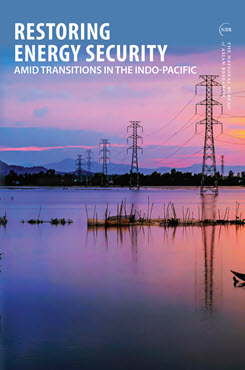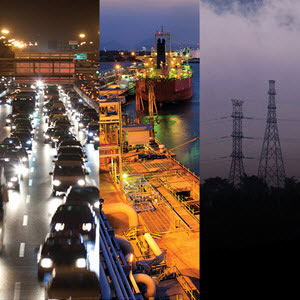Essay in NBR Special Report 112
The Emergence of Carbon Capture, Utilization, and Storage
Policy Implications for the Indo-Pacific
This essay explores the critical role of carbon capture, utilization, and storage (CCUS) in addressing energy security and achieving net-zero emissions within the Indo-Pacific region.
EXECUTIVE SUMMARY
MAIN ARGUMENT
As Indo-Pacific nations industrialize, energy demand will rise, creating an urgent need to reduce carbon emissions without compromising economic growth. CCUS can serve as a transitional solution, reducing emissions from existing fossil fuel infrastructure while renewable energy capacity is developed. It thus offers a viable path to balance the clean energy transition with economic stability, especially in fossil fuel–dependent economies. However, the deployment of CCUS faces multiple challenges, including high costs, long development timelines, technological limitations, and a lack of regulatory frameworks in many Indo-Pacific nations. Additionally, political instability and regional geopolitical tensions further hinder the international collaboration needed to establish cross-border CO2 transport and storage infrastructure.
POLICY IMPLICATIONS
- Strengthen regulatory frameworks for CCUS. Indo-Pacific countries should integrate CCUS into their climate commitments and energy transition policies. Developing clear regulations and standards for CCUS operations would provide a foundation for sustainable project development.
-
Encourage regional cooperation. To overcome geographic and resource limitations, countries in the Indo-Pacific should work toward geopolitical stability and cooperative agreements, similar to the European Union’s “networks and hubs” model, to facilitate shared CO2 transport and storage solutions.
- Increase financial incentives for CCUS. Governments should introduce financial mechanisms such as subsidies, tax credits, and grants to lower the high costs associated with CCUS deployment. This would attract private investment and enable larger-scale adoption of these technologies.
- Promote technological innovation and capacity building. International partnerships involving the U.S., EU, and Asian countries could drive research and development to lower costs, improve technology, and develop an international certification system for CCUS carbon removal, facilitating a more robust CCUS infrastructure in the Indo-Pacific.
Fan Dai is a Principal Investigator at the University of California, Berkeley; a Senior Fellow at the Kennedy School of Government, Harvard University; and a Researcher with the Institute for Climate and Carbon Neutrality, University of Hong Kong. Dr. Dai has played a significant role leading California’s collaboration with China on climate, energy, and environment. She was appointed by Governor Edmund G. Brown Jr. as special advisor on China. Under Brown, Dr. Dai chaired the state’s China Interagency Working Group and acted as the state’s liaison on its critical economic and environmental initiatives on China. Her research is focused on market mechanisms for climate change mitigation, energy efficiency, and innovation.
Note: The author would like to thank Rixin Zhu, a fellow in the California-China Climate Institute at the University of California, Berkeley, for assisting in data collection and analysis for this project and preparation of the draft.



